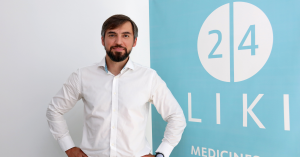Only have 1 minute? Here are 3 key takeaways:
• Co-based in Sofia, Bulgaria and Denver, Colorado, digital mental healthcare platform Sentur announced a first round of undisclosed external investments.
• Sentur’s backers include stellar names from the Telerik Mafia
• The company appointed Telerik tech veteran Georgi Atanasov as CTO and is set to expand its Bulgarian team and its US presence.
Founded by former Telerik CTO Faris Sweis and seasoned clinical psychologist Sarah Houy, the platform combines AI and digital therapy and is designed as an accessible and effective digital companion that provides 24/7 support for its users.
“Sometimes we think of mental health support as binary. You are either on your own or have a therapist. But between those two points of support, there is a spectrum of things we can do to provide people some level of help. Peer support, community, and qualified coaches can fill a big gap in this space. The technology to connect people was invented more than 20 years ago (i.e social networks), we will see more providers delivering these elements as built-in in their platform as we move forward,” Sweis tells The Recursive.
Regarding its investment, the company will also use the funds to further expand its team in Sofia and its presence in the US, while it gears up for a seed round in 2024. During the current year, the company saw a 12-fold increase in growth and added over 1,000 customers mostly in North America, UK, and Australia, amid growing demand for mental health services worldwide.
“Team-wise, we are expanding our team in Sofia next year across marketing and development. On the go-to market, we are focused on expanding our reach to treatment facilities in the US where they are also limited by qualified staff. Sentur can quickly be deployed in those facilities to deliver quality trauma care while also allowing them to extend care to their clients on discharge,” Sweis further explains. The Recursive.
Business angels that backed Sentur include Hristo Kosev (co-founder of Telerik, Telerik Academy & Healee), Boyko Iaramov (co-founder of Telerik, Telerik Academy & Campus X), Hristo Borisov (co-founder & CEO of Bulgarian unicorn Payhawk), Alexandra Mechkova (CEO of Telerik Academy), Pavel Iliev (CTO at Modeshift), Zoran Arsovski (Founder of VertoDigital) and Vessy Tasheva (Founder of Vessy.com).
Democratizing access to therapeutic help
For the company’s investors, there is an increased need for democratizing access to therapeutic help, and this is where the Sentur platform comes in.
“That is why what the Sentur team is doing is so important – by both providing proper and accessible digital therapeutic services to much wider audiences and assisting therapists to amplify the effect of their work, Sentur provides users access to 167-hour support outside of the 1-hour weekly session they have with their therapist. Most of the healing work happens outside of the 1:1 session with a professional and thanks to Sentur this can be guided while keeping the therapist informed and making the next session more focused and productive,” Alexandra Mechkova, CEO of Telerik Academy and investor in Sentur, said in a statement.
According to the company’s newly appointed CTO Georgi Atanasov, the use of AI will bring even more advanced solutions in the field.
“The challenges in mental health care are both critical and complex. With today’s technological advancements, particularly in AI, we’re not just making marginal improvements; we’re aiming for solutions that are ten times better. The progress we’ve made in just the last two years is astounding, and the potential applications are revolutionary,” Atanasov said.
Moreover, as for future trends in digital healthcare, Sentor’s co-CEO Sweiss expects an even wider integration of AI and its functionalities.
“As this technology matures, there will be many use cases and applications not only in digital mental health but in healthcare in general. Unlike other fields, this integration will be highly scrutinized as it must be validated, tested, and responsibly applied. So expect a lot of back-and-forth between technologists and clinicians on the best ways to apply it,” Sweis concludes.








